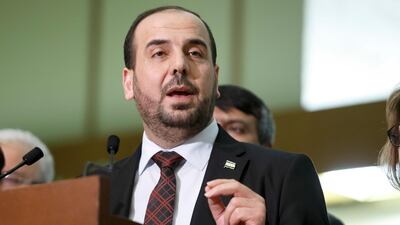The UN special envoy for Syria is to invite the Syrian opposition delegation to Geneva for the intra-Syrian talks beginning next week as his deputy held talks with Syrian officials in Damascus over this month's negotiations.
Staffan de Mistura's announcement on Saturday came a day after the opposition named its unified delegation, which includes internal and external groups. The talks in Geneva start on Tuesday. The Syrian opposition's 36-member delegation will be headed by Nasr Al Hariri, a cardiologist who took part in previous talks in Geneva over the past year.
The statement said Mr de Mistura takes particular note that an opposition negotiating team has been announced and tasked to negotiate in Geneva without any preconditions, and that the implementation of relevant United Nations resolutions is regarded as the sole reference for the negotiation.
On Friday the opposition concluded a three-day meeting in Saudi Arabia in which its representatives called for direct and unconditional negotiations with the Syrian government that would lead to the launch of a transition period.
The opposition refrained from saying their participation in the upcoming UN-based negotiations would be conditional upon the departure of President Bashar Al Assad from office, indicating a degree of flexibility. The issue has always been the sticking point in previous rounds of talks, deepening division among an already fragmented opposition.
Speaking in the Saudi capital of Riyadh late on Friday, Mr Al Hariri said, "The direct talks are to achieve a specific goal which is political transition." All topics were up for discussion, he added in was an apparent reference to President Assad's future.
The Syrian government delegation has in the past said the fate of Mr Assad is not up for negotiation, vowing not to give the opposition through peace talks what they failed to achieve through war.
In Damascus, Mr de Mistura's deputy, Ramzy Ramzy, held talks with Syria's deputy foreign minister and chief negotiator, Faisal Mekdad. Afterwards Mr Ramzy said the Geneva talks will cover four main topics : a new constitution, governance, elections and combating terrorism, with the focus mostly on the constitution and elections. There is no information yet about who the government is sending to the talks
Asked if he expects a breakthrough in the Geneva talks, Mr Ramzy said "The political process is difficult and complicated because the situation in Syria is complicated, so we are building our strategy one step at a time. I hope that the next round with effective participation of the government and the presence of a united opposition team will help in pushing the matter forward."
______________
Read more:
America pledges to stop arming Kurdish fighters
Syrian opposition insists Assad must leave before negotiations begin
______________
The unified opposition delegation will comprise members from various groups including the High Negotiations Committee (HNC), as well as the Cairo and Moscow-based platforms.
Syria's disparate opposition has been under heavy pressure to unify their ranks and row back on some of their more radical demands after a series of battlefield victories that have given Mr Assad's regime the upper hand.
"We expect the other side (Syrian regime) to come to the negotiations so that we can all move forward in the political process," Mr Al Hariri said.
Several rounds of talks hosted by the United Nations have failed to bring an end to the Syrian conflict, which has killed more than 330,000 people since 2011 and forced millions from their homes.
Meanwhile in a telephone call, Iranian president Hassan Rouhani told Mr Assad that Iran would stand by Syria in the fight against terrorism and in the reconstruction of the country.

